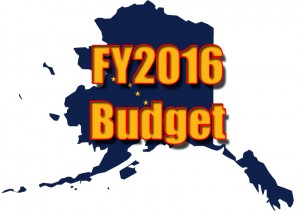 Friday, March 13, 2015, Juneau, Alaska – The Alaska House of Representatives early this morning passed a Fiscal Year 2016 statewide operating budget with a historic 10 percent reduction in unrestricted general funds (UGF). Faced with a $3.5 billion deficit, the House Finance Committee found $229 million in reductions to day-to-day agency operations, while prioritizing protecting the economy and core services. The nonpartisan Legislative Finance Division reports the 10 percent reduction as the largest in state history. The House also approved the FY2016 Mental Health budget.
Friday, March 13, 2015, Juneau, Alaska – The Alaska House of Representatives early this morning passed a Fiscal Year 2016 statewide operating budget with a historic 10 percent reduction in unrestricted general funds (UGF). Faced with a $3.5 billion deficit, the House Finance Committee found $229 million in reductions to day-to-day agency operations, while prioritizing protecting the economy and core services. The nonpartisan Legislative Finance Division reports the 10 percent reduction as the largest in state history. The House also approved the FY2016 Mental Health budget.
“No one predicted the sharp drop in oil prices, nor the state losing more than 50 percent of expected revenue over the past few months. With that in mind, we had to adjust – prioritize needs versus wants and not shock the economy,” said House Finance Committee Co-Chair Mark Neuman, R-Su-Valley. “This budget reflects a careful look at what the core functions of government should be. The services Alaskans have come to expect will be preserved as best as we can, while this bill starts the discussion on what level of government services we can afford now and into the future.”
The House Finance Committee Substitute (CS) for the operating budget, House Bill 72, reduces the UGF total agency operations budget by $376.9 million.
Budget totals are:
$9.515 billion in all funds – a $3 billion reduction from the current year budget.
$4.126 billion in UGF for agency operations, including formulas like education and Medicaid.
$2.054 billion in unrestricted general funds – the record 10 percent reduction in day-to-day agency operations.
“We took care of one of the ‘Big Three’ cost drivers last year – public employee retirement – and we’re dealing with the other two – education and health care – this year,” said Neuman. “More work lies ahead. We’ve already begun the discussions with the executive branch so we can work with state departments over the interim to wisely rethink the size, shape and functions of government. We must continue to examine every department and every program to ensure they are as effective and efficient as possible.”
Neuman and House Majority leadership directed Finance Subcommittees to focus on UGF, because the difference between UGF revenue and expenditures equals Alaska’s fiscal gap. The Finance Committee added an extra day of public testimony, heard from 465 LIO testifiers, received 811 written comments, and adopted 33 amendments.
State statute requires that mental health funding be presented in a separate appropriation bill, making it easier to track what funds the state invests in that area. So what you see in HB 73 is the general fund/mental health (GF/MH) and Mental Health Trust Authority Authorized Receipts (MHTAAR) investments in mental health programs. All mental health spending is accounted for in the operating budget reports prepared by the Legislative Finance Division.
HB 72 & HB 73 now move to the Alaska Senate for consideration.
